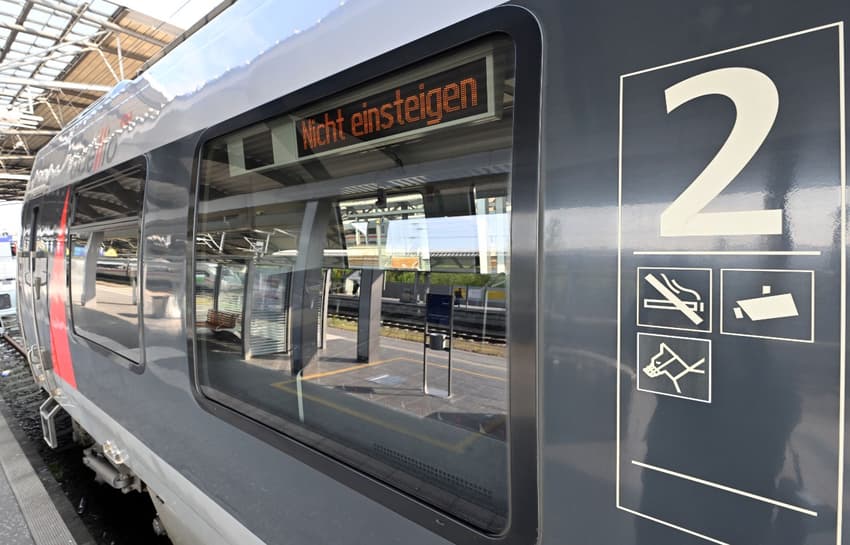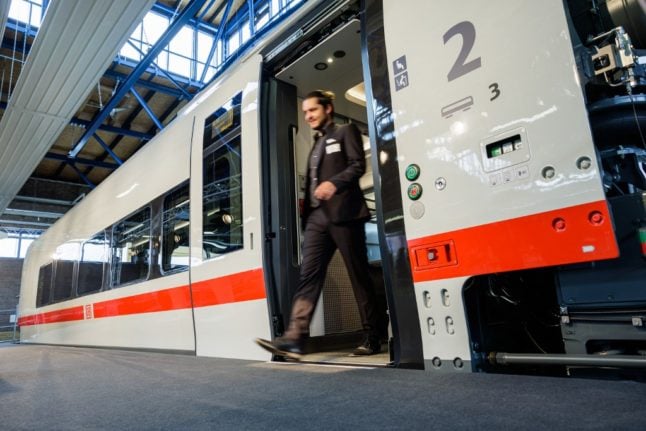Could Deutsche Bahn still see more rail disruption after cancelled 'megastrike'?

A last-ditch agreement between Deutsche Bahn and rail union EVG at the weekend meant Germany narrowly avoided a 50-hour strike - but the deal doesn't necessarily mean the walk-outs are over. Here's what you need to know.
What's going on?
Commuters were able to breathe a sigh of relief over the weekend as a planned 50-hour long train strike was suddenly put on hold. Rail union EVG had planned to paralyse the rail network between 10pm on Sunday and midnight on Tuesday, with tens of thousands of workers expected to take part in the walkout.
In the end, though, a last-minute challenge by Deutsche Bahn in a Frankfurt Court saw the strike called off on Saturday evening. In a press statement, the national rail operator revealed that the two sides had successfully reached a settlement in order to avert the two-day strike. According to Deutsche Bahn, the two sides promised to negotiate "swiftly and constructively" with the aim of reaching a quick resolution in the pay dispute.
READ ALSO: Megastrike cancellation: Why are trains around Germany still facing disruption?
"In the interests of the railway undertakings, their customers and the industry, we did everything we could to avert this strike, with success," said DB personnel director Martin Seiler. "Of course, such a compromise always includes both sides."
This means that - for now at least - the majority of rail passengers in Germany can continue to use S-Bahn, regional and long-distance rail services as normal. But with the dispute ongoing, this doesn't necessarily mean the transport chaos is at an end.
What's the disagreement about?
Over the past few months, EVG has been busy negotiating a new collective agreement on behalf of around 230,000 rail workers. Around 180,000 of these employees work for Germany's state-owned rail operator Deutsche Bahn, while the rest work for around 50 smaller private companies that operate regional services, such as BOB and BRB in Bavaria.
With inflation almost hitting the seven-percent mark last year, workers are desperate for a significant pay rise. In particular, EVG is keen to ensure that workers in the lowest income bracket take home a significantly higher wage to help them cope with the rising cost of living.
For this reason, the union has demanded a minimum pay rise of €650 per month for all workers, or a 12 percent pay rise for those on higher incomes. In return, Deutsche Bahn has offered a ten percent pay rise for lower and middle-income workers, or eight percent for higher-income workers, as well as a tax-free payment of €2,850 to compensate for inflation.
But the real issue relates to the minimum wage for Deutsche Bahn employees, which is currently set at €12.62 per hour. After the government introduced a statutory minimum wage of €12 per hour last December, EVG negotiated a new rate for the lowest earners at DB - but so far, this has only been paid out through bonuses.

A man steps out a Deutsche Bahn's ICE L train with a step-free entry and exit, during a press event in Berlin, on September 14, 2022. (Photo by JENS SCHLUETER / AFP)
In the latest round of negotiations, EVG is pushing to have the €12.56 per hour minimum wage enshrined in the collective agreement. This would mean that pay for the lowest earners would go up at the same rate.
There seems to have been a small breakthrough during the court hearing on this issue. In their press statement, Deutsche Bahn said: "The issue of the minimum wage is also part of the settlement and is recognised by both parties as a solution."
Could there still be more rail strikes?
Yes. The regional rail operators - including three major operators in Bavaria - have still been the target of strikes in recent days, and the continued peace between EVG and Deutsche Bahn appears to depend on how much the national rail operator sticks to its word.
READ ALSO: Train services disrupted in Bavaria as regional workers go on strike
For its part, EVG has said it would be willing to paralyse train services again under certain circumstances. It called on Deutsche Bahn after the strike suspension to "immediately enter into negotiations with us on the issue of minimum wages". Should Deutsche Bahn "break its word, we will call another strike", their spokesperson said.
The next round of negotiations is scheduled for May 23rd, but could start earlier if both sides decide to resume talks at any earlier date.
Given that earlier talks have been broken off before the scheduled end date, it's likely to be an intensive round of negotiations this time around.
If those talks fail once again, rail passengers in Germany could see much more disruption than they have in recent months - potentially lasting for days or even weeks.
Comments
See Also
What's going on?
Commuters were able to breathe a sigh of relief over the weekend as a planned 50-hour long train strike was suddenly put on hold. Rail union EVG had planned to paralyse the rail network between 10pm on Sunday and midnight on Tuesday, with tens of thousands of workers expected to take part in the walkout.
In the end, though, a last-minute challenge by Deutsche Bahn in a Frankfurt Court saw the strike called off on Saturday evening. In a press statement, the national rail operator revealed that the two sides had successfully reached a settlement in order to avert the two-day strike. According to Deutsche Bahn, the two sides promised to negotiate "swiftly and constructively" with the aim of reaching a quick resolution in the pay dispute.
READ ALSO: Megastrike cancellation: Why are trains around Germany still facing disruption?
"In the interests of the railway undertakings, their customers and the industry, we did everything we could to avert this strike, with success," said DB personnel director Martin Seiler. "Of course, such a compromise always includes both sides."
This means that - for now at least - the majority of rail passengers in Germany can continue to use S-Bahn, regional and long-distance rail services as normal. But with the dispute ongoing, this doesn't necessarily mean the transport chaos is at an end.
What's the disagreement about?
Over the past few months, EVG has been busy negotiating a new collective agreement on behalf of around 230,000 rail workers. Around 180,000 of these employees work for Germany's state-owned rail operator Deutsche Bahn, while the rest work for around 50 smaller private companies that operate regional services, such as BOB and BRB in Bavaria.
With inflation almost hitting the seven-percent mark last year, workers are desperate for a significant pay rise. In particular, EVG is keen to ensure that workers in the lowest income bracket take home a significantly higher wage to help them cope with the rising cost of living.
For this reason, the union has demanded a minimum pay rise of €650 per month for all workers, or a 12 percent pay rise for those on higher incomes. In return, Deutsche Bahn has offered a ten percent pay rise for lower and middle-income workers, or eight percent for higher-income workers, as well as a tax-free payment of €2,850 to compensate for inflation.
But the real issue relates to the minimum wage for Deutsche Bahn employees, which is currently set at €12.62 per hour. After the government introduced a statutory minimum wage of €12 per hour last December, EVG negotiated a new rate for the lowest earners at DB - but so far, this has only been paid out through bonuses.

In the latest round of negotiations, EVG is pushing to have the €12.56 per hour minimum wage enshrined in the collective agreement. This would mean that pay for the lowest earners would go up at the same rate.
There seems to have been a small breakthrough during the court hearing on this issue. In their press statement, Deutsche Bahn said: "The issue of the minimum wage is also part of the settlement and is recognised by both parties as a solution."
Could there still be more rail strikes?
Yes. The regional rail operators - including three major operators in Bavaria - have still been the target of strikes in recent days, and the continued peace between EVG and Deutsche Bahn appears to depend on how much the national rail operator sticks to its word.
READ ALSO: Train services disrupted in Bavaria as regional workers go on strike
For its part, EVG has said it would be willing to paralyse train services again under certain circumstances. It called on Deutsche Bahn after the strike suspension to "immediately enter into negotiations with us on the issue of minimum wages". Should Deutsche Bahn "break its word, we will call another strike", their spokesperson said.
The next round of negotiations is scheduled for May 23rd, but could start earlier if both sides decide to resume talks at any earlier date.
Given that earlier talks have been broken off before the scheduled end date, it's likely to be an intensive round of negotiations this time around.
If those talks fail once again, rail passengers in Germany could see much more disruption than they have in recent months - potentially lasting for days or even weeks.
Join the conversation in our comments section below. Share your own views and experience and if you have a question or suggestion for our journalists then email us at [email protected].
Please keep comments civil, constructive and on topic – and make sure to read our terms of use before getting involved.
Please log in here to leave a comment.